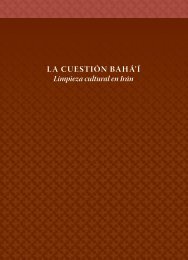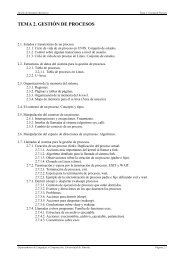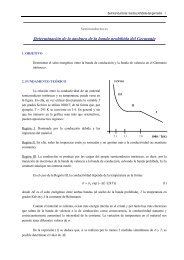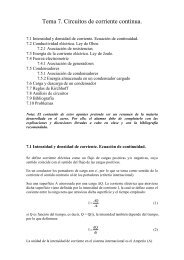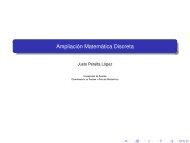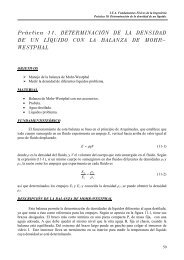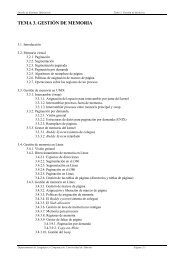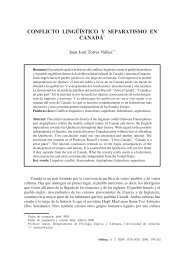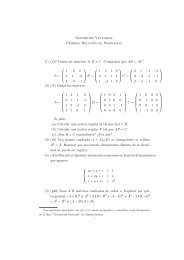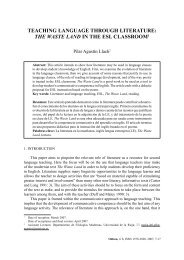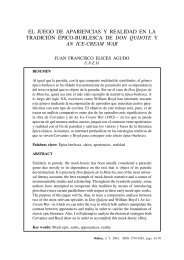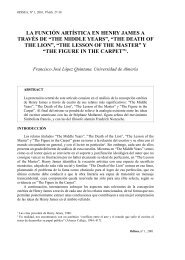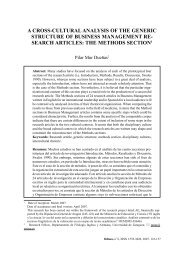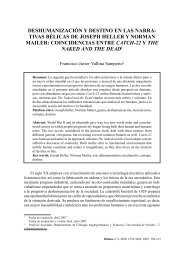el teatro de edward bond - Universidad de AlmerÃa
el teatro de edward bond - Universidad de AlmerÃa
el teatro de edward bond - Universidad de AlmerÃa
You also want an ePaper? Increase the reach of your titles
YUMPU automatically turns print PDFs into web optimized ePapers that Google loves.
DESPUÉS DE BRECHT: EL TEATRO DE EDWARD BOND<br />
175<br />
En su intención <strong>de</strong> implicar a la audiencia emocionalmente, Bond crea los “aggroeffects”<br />
que difieren <strong>de</strong> los “alienation effects” <strong>de</strong> Brecht, aunque ambos comparten una<br />
function didáctica: “In contrast to Brecht, I think it’s necessary to disturb an audience<br />
emotionally, to involve them emotionally in my plays, so I’ve had to find ways of making<br />
that “aggro-effect” more complete, which is in a sense to surprise them” (citado en Innes,<br />
1982: 199). Innes <strong>de</strong>fien<strong>de</strong> así la violencia presente en las obras <strong>de</strong> Bond como “a measure<br />
of urgency” y la necesidad <strong>de</strong> presentar la obra teatral no como catarsis aristotélica sino “as<br />
a sort of shock therapy <strong>de</strong>signed to galvanize their consciences into life and provoke them<br />
into viewing society “objectiv<strong>el</strong>y” and “rationally”” (199). Rabey (1986: 114) también<br />
entien<strong>de</strong> que <strong>el</strong> uso <strong>de</strong> las emociones en <strong>el</strong> <strong>teatro</strong> <strong>de</strong> Bond como llamada <strong>de</strong> atención<br />
supone una ruptura fundamental con Brecht. Bond busca una respuesta efectiva en <strong>el</strong><br />
espectador que sólo es posible por medio <strong>de</strong> imágenes duras y sorpren<strong>de</strong>ntes que obligan<br />
a la reflexión y la acción.<br />
Bond (1978: 35) preten<strong>de</strong> <strong>de</strong>sarrollar un “V-effect” 2 menos abstracto que Brecht y más<br />
positivo: “if V-effect becomes mer<strong>el</strong>y the removing of emotional tension so that the object<br />
or situation being inspected just, as it were, floats loose”. En sus últimas obras, Bond ha<br />
continuado <strong>de</strong>sarrollando esta i<strong>de</strong>a en lo que ha <strong>de</strong>nominado Theatre Events (TEs). Spencer<br />
(1992: 227) <strong>de</strong>fien<strong>de</strong> la ampliación d<strong>el</strong> enfoque <strong>de</strong>s<strong>de</strong> los iniciales “aggro-effects” hasta<br />
los TEs sugiriendo un cambio “in the text-actor-audience dynamic” pero aún se observan<br />
claras diferencias con los “A-effect” brechtianos a pesar <strong>de</strong> compartir un similar propósito<br />
político: “TEs explicitly promote audience analysis of a situation that presents its<strong>el</strong>f<br />
onstage as unacceptable (violent), paradoxical (stranged), unb<strong>el</strong>ievable (exaggerated,<br />
un<strong>de</strong>rstated, or absurd), or ironic” (227). El propio Bond (1998: 325) en “Commentary of<br />
the War Plays” encuentra las bases <strong>de</strong> las diferencias entre los efectos brechtianos y los TEs<br />
en las teorías <strong>de</strong> la Ilustración:<br />
TEs are not simple Brechtian alienation effects. […] Yet alienation theory <strong>de</strong>pends on a<br />
philosophy of mind h<strong>el</strong>d by Di<strong>de</strong>rot and other eighteenth-century rationalists. It appeals to<br />
objective judgement but does not secure the means of achieving it. The mind cannot get<br />
outsi<strong>de</strong> its<strong>el</strong>f to be objective. The structure of mind is part of the continuum of society.<br />
A<strong>de</strong>más <strong>de</strong> la base filosófica, los TEs difieren <strong>de</strong> los “A-effects” en cuanto a la autoridad<br />
que confieren al espectador. Rein<strong>el</strong>t (1994: 79) explica que en <strong>el</strong> <strong>teatro</strong> actual la<br />
audiencia se convierte en responsable <strong>de</strong> su propia autoridad: “in TEs the authority resi<strong>de</strong>s<br />
with the producers of that meaning, the triangle of participants and their work on the<br />
text(s)”, mientras que Brecht ap<strong>el</strong>aba a una autoridad externa. Bond también entien<strong>de</strong> que<br />
la alienación <strong>de</strong> Brecht es habitual en <strong>el</strong> <strong>teatro</strong> contemporáneo, por tanto, <strong>el</strong> reto es “to<br />
manipulate the metatext to make the audience the authority– to make them <strong>de</strong>ci<strong>de</strong> what<br />
the alienation is” (citado en Rein<strong>el</strong>t, 1994: 79). Su nueva concepción preten<strong>de</strong> ir más allá<br />
<strong>de</strong> la alienación <strong>de</strong> Brecht y reconoce en una <strong>de</strong> sus cartas que “what has to be alienated is<br />
not the stage but the audience” (Stuart, 1995: 187).<br />
2<br />
Bond se refiere a los “alienation effects” <strong>de</strong> Brecht en algunas ocasiones como “V-effect”, tomado d<strong>el</strong><br />
original alemán Verfremdungseffekt o en otras ocasiones como “A-effect”.<br />
Odisea, n º 5, 2004



